loyola llothta
☭☭☭
I told you dont trust the haitian police. they just want money ... They aint fighting for the peopleshyts still the same shyt in Haiti but with coronavirus smdh.
I told you dont trust the haitian police. they just want money ... They aint fighting for the peopleshyts still the same shyt in Haiti but with coronavirus smdh.
Sometimes thinking about the shyt is stressfull.shyts still the same shyt in Haiti but with coronavirus smdh.

Al jaz been on some suck shyt. they not going to tell you what’s really going onAre they murdering children outright now?Given the times, I find it hard to believe it wasn't anything but intentional.

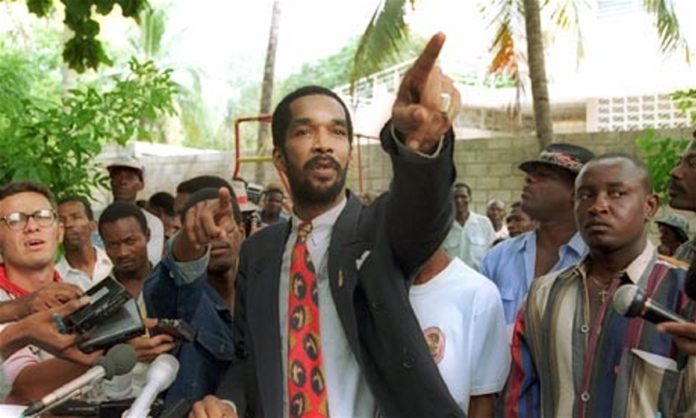
As the COVID-19 pandemic has shut down borders and airports across the world, planes chartered by U.S. Immigration and Customs Enforcement (ICE) continue to fly. Every two or three weeks, a deportation flight operated by Swift Air, LLC has landed at the Port-au-Prince airport. After one such flight in early April, at least three of those deported tested positive for COVID-19. The pandemic is now sweeping through ICE detention facilities, putting the lives of tens of thousands at risk and highlighting the public health ramifications of continued deportations.
Next week, another ICE Air deportation flight is scheduled to arrive in Haiti. But the controversy will extend far beyond the health and well-being of those on board. According to a flight manifest obtained by Haiti: Relief and Reconstruction Watch, ICE is planning to deport Emmanuel “Toto” Constant, a former death squad leader who has been in a New York state prison for the past 12 years on grand larceny and mortgage fraud charges. Constant is listed in the manifest as a “High Profile Removal.”
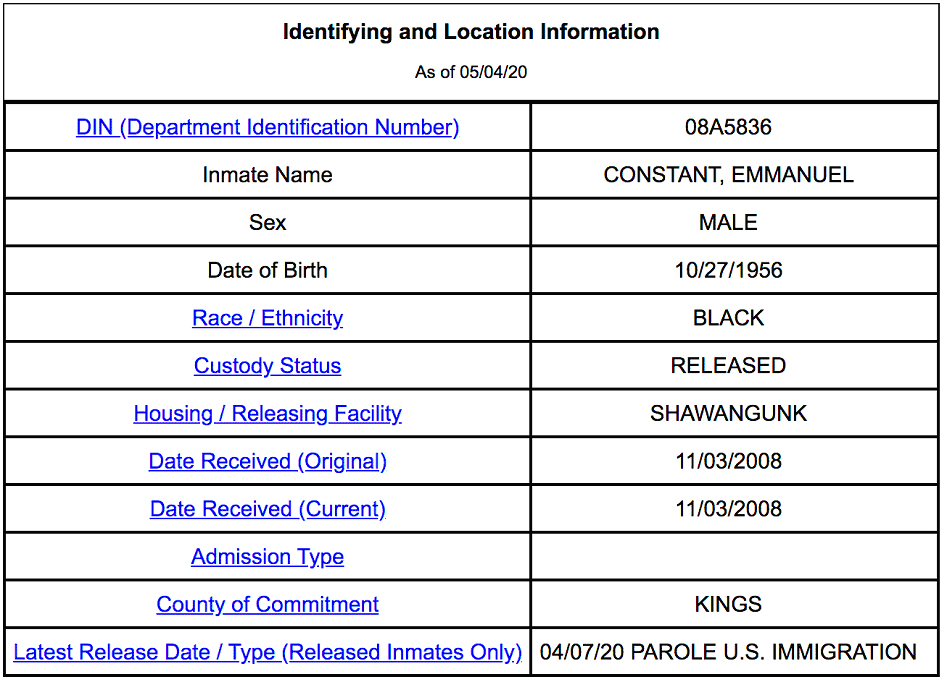 Sources: http://nysdoccslookup.doccs.ny.gov/ and https://locator.ice.gov/odls/#/index.
Sources: http://nysdoccslookup.doccs.ny.gov/ and https://locator.ice.gov/odls/#/index.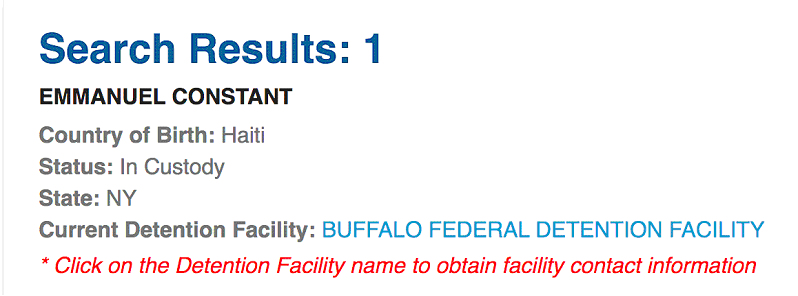
Continued deportations have presented an additional strain on an already overburdened public health system, as the Haitian government has been forced to use scarce resources to quarantine and care for the dozens who arrive every few weeks. In late April, a government-backed scientific commission supporting the country’s COVID-19 response asked President Jovenel Moïse to halt further deportations during the pandemic. Representatives of the Haitian government did not respond to a request for comment.
ICE has announced it will increase testing of deportees after pushback from regional governments, but it is unclear how systematic the testing will be. ICE has stated that they would only receive about 2,000 tests per month — far below the estimated number of deportations. Nevertheless, the recent ICE changes have assuaged concerns from some countries in the region, which have been under increasing diplomatic pressure from the Trump administration to continue allowing ICE Air deportation flights.
According to data compiled by Center for Economic and Policy Research, ICE has made at least 246 deportation flights since the beginning of February. After a brief respite, this week the pace of deportations has increased dramatically.
The Haitian government has pushed back on the deportations. Claude Joseph, the foreign minister, told the Miami Herald in April that he had been in communication with his counterparts in the U.S. advocating for a moratorium on deportation flights. He said that the U.S. had agreed to temporarily suspend the deportation of those with “criminal” backgrounds to avoid further crowding Haiti’s already overcrowded prison system. But, the U.S. has thus far rejected an outright stop to the flights. A former Haitian government official said that there had been continued discussions around a moratorium of all flights. It appears that effort has failed.

Every two or three weeks, a Swift Air jet – also derogatively called “ICE Air” — lands in Port-au-Prince bringing U.S. deportees. After a flight in early April, at least three deportees tested positive for COVID-19.
On Mon., May 11, the next ICE Air deportation flight is scheduled to arrive in Port-au-Prince, according to the flight manifest. ICE identifies 51 of the flight’s 101 passengers as having criminal backgrounds. One of those is Constant, the 63-year old former death squad leader. ICE did not respond to a request for comment; the agency has a general policy of not commenting on future deportation flights. The flight manifest is a “tentative” list of passengers; it could still be changed before the flight.
Constant was facing up to 37 years in jail, but New York State prison records show that Constant was released to ICE custody on Apr. 7 — 12 years after his conviction — in order to face deportation. Constant’s next parole hearing had been scheduled for August 2020. ICE records show he is currently being held at the ICE federal detention facility in Buffalo, NY — where at least 45 of those detained have confirmed COVID-19 cases.
Constant was the former head of the Revolutionary Front for the Advancement and Progress of Haiti (FRAPH), a paramilitary organization that was responsible for the extrajudicial killing of an estimated 3,000 to 4,000 Haitians in the aftermath of the 1991 military coup — as well as thousands of incidents of rape, torture, and arbitrary detention. Constant, it was later revealed, was on the CIA payroll during this period.
Upon the return of President Jean-Bertrand Aristide in late 1994, Constant left Haiti and settled in the New York City area. In 2000, a Haitian court convicted Constant and 14 others in absentia for their involvement in a 1994 massacre in the small town of Raboteau. A civil action resulted in a $140 million award to victims’ families. In 2005, following the second ouster of Aristide, the high court in Haiti overturned the sentences for those who had been tried in person. The judgment against Constant remains valid, however, according to human rights organizations.
TOTO CONSTANT IS THE MOST NOTORIOUS AMONG THE 101 HAITIANS THAT THE U.S. INTENDS TO DEPORT NEXT WEEK.
U.S. courts have also recognized Constant’s responsibility for crimes against humanity, however. On behalf of three Haitian women who had been terrorized by Constant, the Center for Justice and Accountability (CJA) and the Center for Constitutional Rights (CCR) brought a civil case against Constant in 2004 and eventually won a $19 million civil judgment. Constant appealed the ruling, but the judgment was upheld by a federal court in 2009.
Separately, in 2008, Constant was convicted on charges of grand larceny and mortgage fraud in New York State Court and sentenced to 12 to 37 years. He remained in state prison until last month, when he was quietly released to ICE custody. In 2016, when Constant was up for parole, lawyers with CCR and CJA wrote to the New York State Parole Board cautioning against such a release: “If Constant were released from incarceration in New York, he would pose a serious flight risk, and might return to Haiti to exploit the tense situation to his political advantage.”
Now, the Trump administration is putting Constant on an ICE Air deportation flight direct to Haiti. But it remains unclear what will await the former CIA-backed death squad leader upon his arrival.
“If Constant is, indeed, deported to Haiti next week, the obligations of the Haitian criminal justice system are clear,” said Mario Joseph. The state must “arrest Constant as soon as he arrives and ensure that he is held accountable to the people of Haiti.” Joseph, a prominent Haitian human rights lawyer with the Bureau des Avocats Internationaux (BAI), was the lawyer who secured the guilty verdict in the Raboteau Massacre case on behalf of victims’ families. Twenty years later, however, the struggle for justice and accountability remains as distant as ever.
Constant, Joseph said, could either accept the existing judgment against him or demand a new trial as he had been tried in absentia. Joseph noted, however, that Haiti’s justice system has allowed others convicted in the Raboteau Massacre to go free, including Jean Robert Gabriel, who the Haitian government appointed to the high command of the reconstituted Haitian armed forces in 2018. Joseph added that Constant had fled Haiti in 1994 precisely to avoid accountability for his heinous crimes and that the U.S. had failed to execute a judicial order requiring his return to Haiti at the time of the Raboteau trial.
“As with the Raboteau trials, which no one thought could be successfully prosecuted at the time, BAI will continue to advocate for justice for Constant’s victims,” Joseph said. “The law of Haiti is clear on what must happen next. It is my hope that the Haitian government lives up to its responsibilities.”
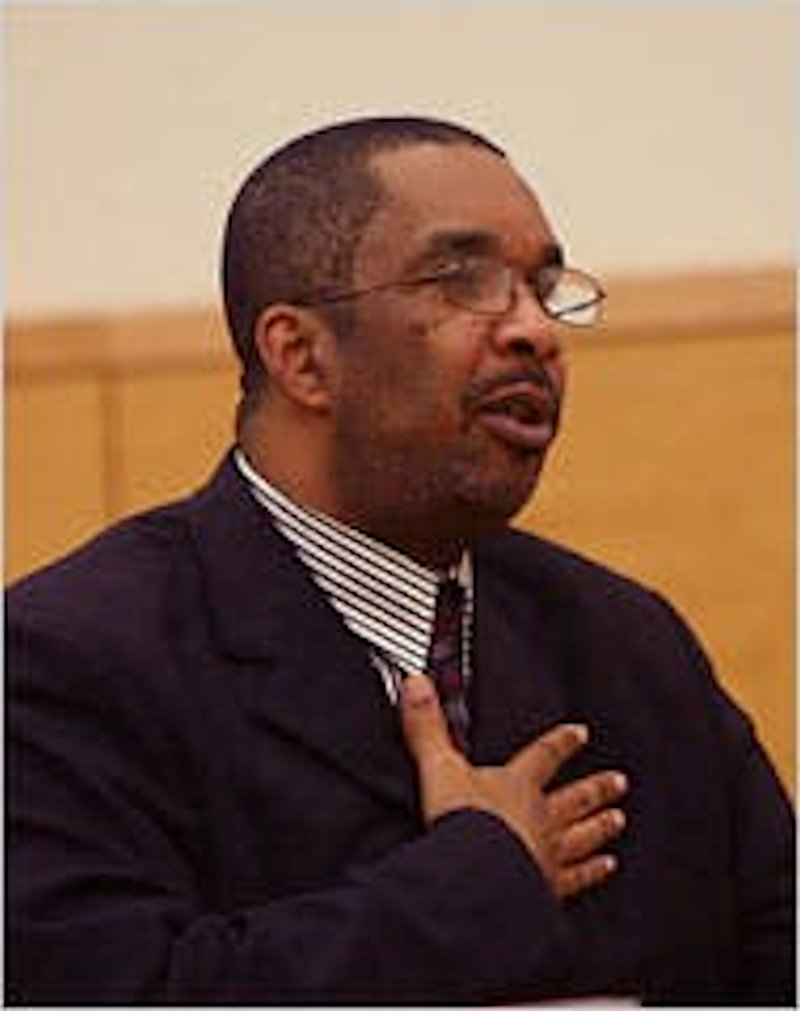
Toto Constant at his 2008 trial in Brooklyn for grand larceny and mortgage fraud. If returned to Haiti, he may well walk free despite crimes against humanity his death-squad committed. Photo: Jesse Ward/NY Times
Constant is the most notorious among the 101 Haitians that the U.S. intends to deport next week, and the case most fraught with political implications. But there will be 100 others, including 50 who may be facing further jail time back in their native Haiti. The Haitian government has thus far been using hotels in the capital to quarantine those who arrive via Swift Air flights every few weeks. It has provided meals and pledged medical support to deportees, but it is unclear what it will do with those facing criminal charges.
In 2019, Haiti’s prison occupancy rate was 358% — the jails are notoriously and chronically overcrowded, holding three-and-a-half times as many as they should be. The pandemic has shone fresh light at the prisons’ horrid conditions — including in the U.S., where COVID-19 is spreading far faster among the prison population than among the general public. Governments across the globe, including in Haiti, are under pressure to remove people from prisons as a matter of public health. From Mar. 19, when Haiti declared a national emergency, to Apr. 15, at least 459 prisoners were released in Haiti, according to the National Human Rights Defense Network.
“Given the inhumane conditions and overcrowding in Haiti’s prisons, it is important the government release those detained — especially the large number of individuals who have never faced a judge and have been held indefinitely while facing only minor charges,” said Rosy Auguste of the National Network for Human Rights Organizations (RNDDH). Even with Haiti’s prisons overflowing, the country is facing a crisis of impunity — with those politically connected seemingly protected from justice. “Further deportations will only place additional strain on Haiti’s institutions,” Auguste added.
ICE is facing increasing pressure in the U.S. over its continued deportations as well. Last week, 15 Senators wrote to Secretary of State Mike Pompeo and Acting Secretary of Homeland Security Chad Wolf requesting a halt to deportations until ICE can ensure all deportees have been tested first. The letter followed previous efforts in the House of Representatives, led by Rep. Frederica Wilson (D-FL), that had called on ICE to suspend all further deportations to Haiti amid the pandemic.
The deportation of Constant “complicates things on so many levels,” said Guerline Jozef, the executive director of the Haiti Bridge Alliance. “We don’t know why they are deporting him now, especially understanding the current situation with Haiti’s politics.” Jozef said she is worried that Constant’s return will create even more instability, especially considering his past conviction by a Haitian court.
But for Jozef, whose organization spearheaded a letter last month from 164 organizations calling for an end to deportations during the pandemic, the bigger picture remains halting all such flights. “No matter how you look at it, continuing with deportations means continued exportation of COVID-19 throughout the region.”
PORT-AU-PRINCE (Reuters) - Haiti’s voodoo leaders have trained priests of the Afro Caribbean religion to concoct a secret remedy for the novel coronavirus and to prepare the sacred initiation chambers of their temples to receive patients.
A Mambo, a voodoo priestess, dances at a ceremony during the outbreak of the coronavirus disease (COVID-19), in Port-au-Prince, Haiti May 1, 2020. Picture taken May 1, 2020. REUTERS/Jeanty Junior Augustin
In Haiti, where Western healthcare services are scarce and too expensive for many, inhabitants often rely on the herbal remedies and ritual practices of their voodoo “houngan” priest or “mambo” priestess.
Draped in necklaces of colorful beads, Haitian Voodoo “Ati” or supreme leader Carl Henri Desmornes said in an interview at his “gingerbread house” in Port-au-Prince he knew there would be a deluge of patients at their temples.
While the virus took root slowly in the poorest country in the Americas, in the last two weeks the number of confirmed cases has nearly quintupled to 865 while reports of a mysterious “fever” are spreading.
“Voodoo practitioners - the Houngans and Mambos in particular - have the responsibility to look after the wellbeing of the population,” said Desmornes, 60, who was a music promoter before becoming the Ati. “They have received the powers and the knowledge to put in practice.”
More than half of Haiti’s 11 million people are believed to practice voodoo, a religion brought from West Africa centuries ago by enslaved men and women and practiced clandestinely under French colonial rule.
Ever since the first cases of the new coronavirus were confirmed in Haiti in mid-March, Voodoo priests have been serving up teas with ingredients including moringa, eucalyptus, ginger and honey to strengthen the immune system.
“We live in a country where the health system is not able to respond to the challenge of the pandemic, so we rely on natural remedies instead,” said Mambo Lamercie Charles as she ladled out potion. “I consider my temple a clinic”.
Voodoo deputy leader Euvonie Georges Auguste said the community, inspired by the “Loas” (spirits), has also come up with a potion for COVID-19 symptoms that they had taught priests virtually to prepare and administer.
The community had identified 1,000 voodoo temples that had a “Djèvo” - a sacred chamber used for initiation rituals - that was separate to the worship chambers and could be used to isolate up to 15 patients each, she said.
CORONAVIRUS MESSAGE
Auguste said it was a shame President Jovenel Moise had highlighted Madagascar’s self-proclaimed, plant-based “cure” for COVID-19 rather than Haitian voodoo treatments.
“This attitude shows he is a victim of the system that still bears the scars of slavery,” she said.
Voodoo is closely identified with Haiti’s struggle for independence but has worked hard for legitimacy. It only won recognition as an official religion in 2003 under President Jean-Bertrand Aristide.
Haiti’s voodoo practitioners in the past have criticized Moise for appealing publicly to Christianity’s god rather than to Voodoo’s spirits.
Sometimes misrepresented in Hollywood and pulp fiction as a black magic cult, it suffers from stigma. Some evangelical preachers blamed the 2010 earthquake on voodoo while mobs lynched at least 45 houngans and mambos they blamed for bringing about the subsequent cholera outbreak with their spells.
Voodoo priests have appeared on television and radio shows to make clear they are not responsible for coronavirus and are ready to fight it.
Still, Desmornes said maybe the pandemic carried a message for the world - one difference between voodoo and Western medicine is that it seeks meaning in illness. Perhaps it was a warning sign, Desmornes said, that humans were like a virus to other beings on earth.
“My hope is that after corona ... instead of transforming all we touch, transforming nature, we look instead to live in harmony with it,” he said.
Anti-Covid19 plant base treatment from Haiti’s herbalist: Dr Inesse Joseph, Ethno-phytotherapist and researcher (Etno-phytotherapeute chercheur.)
The ingredients include 80% Armwas/Armoise (Artemisia Annua= Sweet Wormwood) with 20% natural vitamin c, ginger, cinnamon, Star anise, curcumin, ginseng, et al). One bottle, Dr Joseph, explains in the video will last you for 4 to 5 days. Take a small shot like the cup in the video, twice daily morning and night.

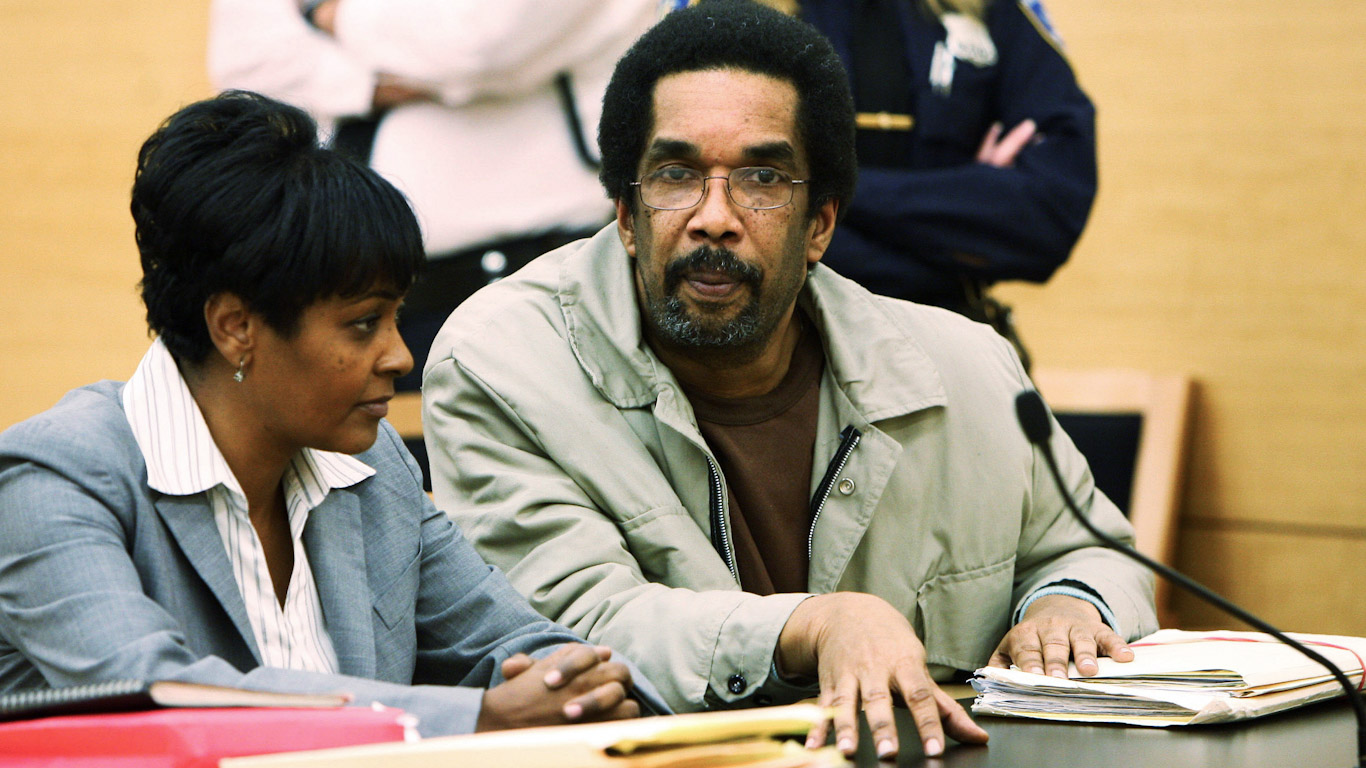
Link:Emmanuel “Toto” Constant exercised his insurance clause as soon as he was apprehended in the Spring of 1995 in New York by the extant Immigration and Naturalisation Service (INS), now a part of the Department of Homeland Security. The infamous leader of Haiti’s Front for the Advancement and Progress of Haiti (FRAPH) had to flee his home country after his CIA-backed militia massacred supporters of President Jean-Bertrand Aristide in the Raboteau massacre.
Today, Constant was supposed to board an ICE deportation flight along with 100 other Haitian nationals in what is the third such flight the Trump administration has carried out to Haiti in the last several weeks. The Haitian government has called for a moratorium on deportations in the midst of the COVID-19 pandemic after three passengers on an earlier flight tested positive for the virus.
The fact that Emmanuel Constant, who is currently serving time in a New York State prison for a 2008 conviction of mortgage fraud and grand larceny, was scheduled to be on Monday’s flight caused unfavorable reactions in some quarters. The Miami Herald carried a quote from Michigan Democrat, Andy Levin, denouncing the deportation: “The idea that the U.S. would deport Toto Constant back to Haiti under these circumstances is terrifying”, asserted Levin adding that Constant’s status as a war criminal in Haiti coupled with that nation’s corrupt court system represented “a huge problem in itself.”
Toto cashes his insurance policy
What’s clear from the notorious death squad leader’s history with the U.S. and its own court system is that many influential people in several of our alphabet agencies do not want Constant on trial in any courtroom.
The first time Constant’s ties to U.S. intelligence became a problem was the result of a lawsuit brought by New York-based Center for Constitutional Rights (CCR) in the mid-nineties on behalf of a gang rape victim by Constant’s FRAPH forces. When CCR’s counsel subpoenaed documents relating to the FRAPH in possession of the CIA and DIA – both of which Constant had implicated after his first arrest – the intel agencies admitted to being in possession of a single document, but reserved their right to withhold it from the proceedings on the grounds that it was “privileged.”
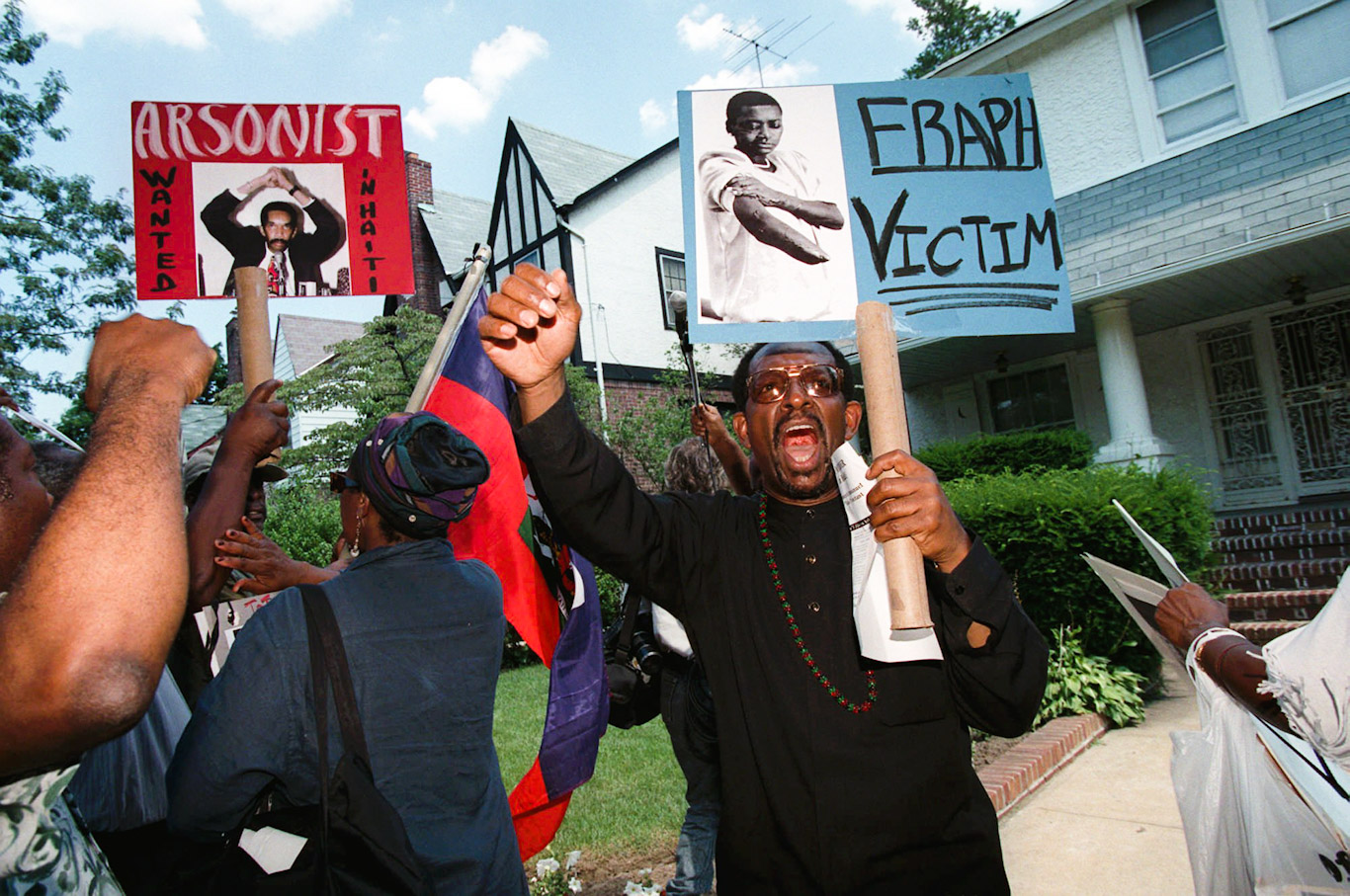
People protest outside of the New York home of Emmanuel ‘Toto” Constant, Aug. 9, 1997. Emile Wamsteker | AP
Eventually, the Department of Defense would cop to having possession of 60,000 pages regarding the creation of FRAPH, which nevertheless remain hidden in their vaults. Constant’s early revelations, such as his direct contact with Defense Intelligence Agency (DIA) handlers and claims of U.S. encouragement to form the anti-Aristide mercenary brigade, bought him an early reprieve from his first close call with deportation.
ICE melts in Fire
Constant is being held at the ICE federal detention facility in Buffalo, NY, where he has been awaiting deportation after being released early from a 37-year sentence related to his fraud convictions in 2008. Some, including the National Network for Human Rights (RNDDH) and 15 Democratic Senators have raised concerns over the ongoing deportation flights. Rosy Auguste, from RNDDH, underlined the danger faced by the “large number” ICE deportees “who have never faced a judge and have been held indefinitely while facing only minor charges” going back to a country undergoing a “crisis of impunity”.
Beyond the controversy surrounding ICE’s very existence and its methods, the situation on the ground in Haiti at present is deteriorating quickly as the country’s fragile economic reality meets the global coronavirus shutdowns and the sinister free-market incentives that keep scarce healthcare supplies from reaching Haiti. While COVID-19 has pushed their hospitals to capacity and thousands try their luck across the border in the Dominican Republic, Haitian Prime Minister Joseph Jouthe revealed during a radio interview last Tuesday that supplies are being held up by air cargo companies serving the highest bidders.
Jouthe also exposed U.S. duplicity when he disclosed that American officials had assured him detainees on the ICE deportation flights had all been tested prior to boarding. Had the Haitian government accepted the information at face value, Haiti would have a much more serious outbreak on its hands.
As Haiti demands that ICE deportation flights be halted, the attempted deportation of Constant at this particular moment raises many questions. DHS tried to deport him once before in 2008 when it tried to keep Constant out of the courtroom and requested the federal judge on his case sentence the Haitian fugitive to time served. But, the judge balked and ordered the son of a Duvalier commander to stand trial for mortgage fraud.
Opaque intentions
Toto Constant modeled the FRAPH on the “Tonton Macoutes” paramilitary units that terrorized Haiti during the Francois Duvalier dictatorship. He asserts that the idea came directly from a DIA attache, and Constant’s first handler, Col. Patrick Collins, to do “intelligence” work in Haiti against pro-Aristide groups.
Constant’s relationship to the U.S. intelligence community was known in Haiti from the very beginning and was convicted by Haitian courts in absentia after the U.S. refused to extradite him when Haiti issued a warrant for his arrest.
Given that elements within Haiti’s present-day government still have ties to the same interests that backed Constant’s FRAPH and have managed to release other FRAPH mercenaries convicted for their roles in the massacre, as well as the persistent and deleterious presence of U.S. deep state entities in the country, the real motive behind Constant’s deportation remains elusive.